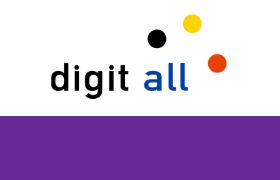Hitting the road to close the digital divide, with DigitAll’s cargo bike and van
DigitAll, the alliance for digital inclusion in Belgium, is launching MobiDig. Thanks to this mobile toolkit with digital devices, social organisations can reach their target groups more easily to improve their digital literacy. During a six-month pilot phase, two social organisations - Hobo and Link in de Kabel - will use the mobile toolkit in different locations.
Digital inclusion
In November 2020, BNP Paribas Fortis established DigitAll, an ecosystem to narrow the digital divide in Belgium and promote digital inclusion. Principal partner Proximus joined the alliance in July 2021. Since September 2021, some thirty companies have signed the Digital Inclusion Charter. In so doing, they have made nine commitments designed to promote digital inclusion.
According to a report of the King Baudouin Foundation, 40% of all Belgians are at risk of becoming digitally marginalised, either because they do not have access to digital resources or because they lack the right skills! In addition to this, some target groups are difficult to reach, complicating matters for social organisations that were set up to improve their digital literacy. Reasons for this include a lack of awareness of the existing learning offering, a fear of the unknown or not seeing the added value of digitalisation.
DigitAll is working on specific solutions to remediate this. BNP Paribas Fortis, CTG Circular, Proximus and VRT joined forces to develop a mobile solution, with guidance from Nova Reperta. Today they are launching MobiDig. The mobile toolkit with digital devices was created to offer support to and stimulate existing social organisations to go to their difficult-to-reach target groups and teach them digital skills in their familiar environment. MobiDig will also develop a roadmap to facilitate this.
A mobile box with digital devices
MobiDig is an easy-to-transport trolley, with hardware, an internet connection and charging options. CTG Circular, Econocom, Proximus and BNP Paribas Fortis donated tablets, smartphones, modems and the boxes for storing and transporting the devices. The BNP Paribas Fortis Foundation provided additional funding. All the hardware is refurbished.
Social organisations can use the mobile box for target groups that are difficult to reach, such as the homeless, vulnerable young people, or the elderly. The box can be used to teach digital skills on-site or organise events to introduce their target audience to the benefits of digital tools.
MobiDig takes care of the logistics side, allowing organisations to focus on their core activities. The organisations also receive support for developing an interesting and stimulating on-site learning experience, including a digital experience, something for which they currently have neither the time nor the resources. This will also increase the target group’s motivation and commitment.
In a first phase, the Brussels-based homeless shelter Hobo and the Leuven-based youth organisation Link in de Kabel will be given the opportunity to work with MobiDig.
An electric cargo bike for Hobo
Hobo’s target group mainly consists of people who rely on the emergency day and night shelters, residents of reception centres, or people who live in an assisted living facility. The social organisation is working with mobile digital training partners to offer these groups on-site training as part of their first step towards digital literacy. These workshops will be hosted by partner organisations that work with the homeless. The MobiDig box can easily travel to various sites across the Brussels-Capital Region, using the electric cargo bike that Arval Belgium donated to Hobo.
Thanks to this mobile solution, Hobo was one of the 30 laureates of Digital Brussels in June 2021. This call for projects was launched by the Brussels-Capital Region in collaboration with the King Baudouin Foundation and the Digital Inclusion Working Group of the CIBG (Centrum voor Informatica voor het Brusselse Gewest).
Daan VinckDirector of Hobo vzwEvery day, our target group, which consists of homeless people, is at risk of exclusion because of the digital barriers they face. They have no or inadequate devices, or they lack the skills to use these devices... Thanks to this mobile solution, we were able to significantly expand the scope of our digital ambition, which is to ensure that every homeless person in Brussels has access to devices and knows how to use them. We organise our mobile workshops in the places where our target group spends time, such as other day centres, reception centres, night shelters, etc. teaching them these skills in their familiar environment. We’ve found this solution works!
A van for Link in de Kabel
Link in de Kabel uses a digital outreach strategy to target the most vulnerable and difficult-to-reach children and young adults, so they too can participate in our digital society. It reaches this target group by visiting organisations and schools that work with these young people and by organising fun and informative on-site activities.
Thanks to MobiDig, Link in de Kabel will be able to expand its offering to regions that are more difficult to reach, where currently only a handful of youth digital transformation projects are available. Initially, Link in de Kabel will focus on OKAN classes (reception classes for non-Dutch speaking newcomers) in Sint-Truiden. This will subsequently be expanded to include the wider region around Sint-Truiden. Arval Belgium is making available a van to Link in de Kabel for two years so they can transport the MobiDig box to the different sites.
David LoyenGeneral Coordinator Link in de KabelDigitAll has given our operations in South Limburg a considerable boost ! Thanks to this mobile solution, which takes our specific needs into account, we can increase the digital skills and digital resilience of more vulnerable young people more easily using reliable equipment. The mobile solution is definitely a plus. Moreover, we can use the prototype that was developed by the students at the Erasmus Brussels University of Applied Sciences and the UX designer to consolidate the impact of our workshops afterwards, ensuring participants have much-needed learning opportunities during their free time.
Optimal user experience
The initiative will be fine-tuned and perfected in time. To keep target groups interested and motivated, DigitAll is also working on optimising the user experience, which is why a UX designer, i.e., a specialist dedicated to designing an adapted user experience, was involved in the pilot projects. Participants will thus be able to use a responsive web app to which the organisations can add exercises and assignments for users, with which the latter can earn a reward, such as a day trip. A group of students of the Multimedia & Creative Technology professional bachelor programme of the Erasmus Brussels University of Applied Sciences and Arts designed a first prototype, in collaboration with Namahn and VRT.
In 2022, MobiDig will further expand, rolling out a pilot project in Wallonia, among others. For the further development and expansion of the project, MobiDig can call on the financial support of the cabinet of Petra De Sutter, Deputy Prime Minister and Minister of Public Affairs, Public Companies, Telecommunications and Postal Services. MobiDig is still looking for organisations that specialise in digital training and that are interested in assisting the most vulnerable people in our society and want to contribute to the initiative’s further development and refinement and future projects.
MobiDig partners
Key partners: BNP Paribas Fortis, CTG Circular, Proximus, VRT.
The key partners received guidance and support from Nova Reperta.
Other partners: Arval Belgium, Brussels Regional Informatics Centre (CIRB-CIBG), Econocom, Erasmus Brussels University of Applied Sciences and Arts, Cabinet of Minister Bernard Clerfayt, Cabinet of Minister Petra De Sutter, Namahn.


